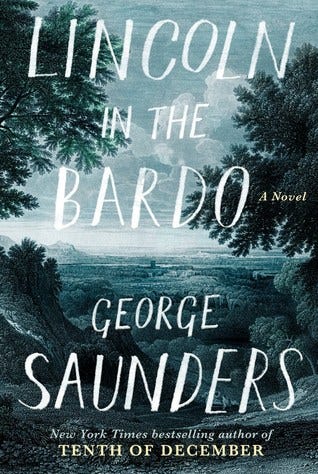Interviews
George Saunders Likes a Challenge
The master of the short story talks about fear, trusting your instincts and publishing a debut novel after all these years

George Saunders is already one of the most prolific writers of this generation. His short stories have captivated the world for two decades, since the release of his first collection, CivilWarLand in Bad Decline, in 1996. In the years since, Saunders has published numerous books of prose, including the 2013 critical darling Tenth of December, but this year, we finally have his first full-length novel — Lincoln in the Bardo. It’s the type of book only a master craftsman like Saunders could pull off.

The story, which tracks President Abraham Lincoln on a visit to the grave of his recently deceased son, is narrated largely by ghosts in the cemetery. Saunders originally conceived the story as a play, but admits that not much carried over from the original concept. Literary heavyweights ranging from Dave Eggers to Zadie Smith have heralded the novel as exceptional, but Saunders remains humble while talking about his work. We chatted via phone about the mistakes young writers make while submitting to MFA programs, why revising is so important, novels vs. short stories, and much more.
Adam Vitcavage: Lincoln in the Bardo had a long gestation from when you conceived it to now. Why did you finally decide to pull the trigger and release it?
George Saunders: I was working on it on the side. I had written it as a play, and none of that version made it into the book. In a nutshell, I couldn’t figure out a way to present it where it would be fun. When I thought of the story, it seemed very strange. It seemed like a straight historical novel, and I knew I couldn’t get any sparks going that way.
In 2012, I finished Tenth of December, and I was in that period that doesn’t have a name but should have one, where the book is done and it’s not out yet. You’re kind of in limbo where your attention is on the book coming out, but you don’t want to waste time. I made a deal with myself that I would try this book. I knew the reason I was afraid to try this — that it would be too hard and too emotionally earnest. I didn’t want to try it. I became mad at myself because I wasn’t sure why I was afraid to write this story that I knew could be beautiful.
There was some sense of a challenge to see if I could just get it going. It took off. I’m not sure if I knew it was good, but it was hard and interesting. It was an artistic challenge that might not turn out well, but it would be a mistake to abandon it.
Vitcavage: When is a story worthy writing? You can start with a bad idea as long as there is something in there, but how do you know?
Saunders: As I’m getting older, I just noticed this, that there are fewer ideas that are dead on arrival. If it gets coughed out, I go on the assumption that I can make it work. That wasn’t true when I was younger. There are things that should have been dropped. I’m a little better at screening out the bad ideas before they get started. That comes after a long life of wasting time on dumb ideas.
A bad idea will come and I know not to go near it. With that, however, you have to be careful. This novel came out of an idea that for 20 years was kept at bay. It was one of those “bad ideas.”
Vitcavage: Were there any other novels that you wrote that fell by the wayside? Or has it always been short stories your entire career?
Saunders: There was one that I started way before CivilWarLand in Bad Decline. It was a novel about a trip to Mexico I took. It just ended up being a big piece of crap. The only person who read it was my wife and I think she made it to about page thirteen and that was the end. That was a novel I actually finished. That made me a little nervous about novels. Other than that there have been things that start out and I realize I’m at page 38. I would try to expand it to page 60 and see that it was wrong then collapse it back down. There were things that looked like they could be novels, but they were stories in their DNA. I think my natural stride is short. Even this novel is only 60,000 words.
Vitcavage: This book is unique for many reasons, one being you write from a variety of voices. Was that because it made telling the story easier?
Saunders: Honestly, the truth is that I cobbled together stories for this book. I always try to keep my eye on the emotional content. I wanted to find a way to narrate this book that didn’t seem lame. There were a bunch of built-in problems. One being that Lincoln is in the graveyard by himself, which was a head scratcher. That produced the ghosts, but having too many was a problem so I put in the historical aspect.
The truthful answer is that these things happen one decision at a time. It was very intuitive. People can get to higher levels of complexity via intuition rather than planning. I don’t remember why, to be honest.
Vitcavage: It’s the way the story needed to be told and it happened. Did you end up coming with a database for the different voices or how did you keep track of everything?
Saunders: No, no. It was just like moving ahead. I would go forward and clean up behind me. Then I would recognize a problem and fix the first couple of chapters. I had some sort of list at one point about the ghosts and when they died. I did a lot of physical mapping because the book was telling me what it wanted to do via time and place. It’s all in the graveyard during one night. I figured out a lot of who is where at what point.
The writing was all at speed. I literally went in one day and said I was going to write the first Hans Vollman speech. That was the one thing held over from the play: his name. It was amazing to me that I realized how many things I could keep in my head without notes. I knew this character was here, here, here. If I changed this I had to go back and change that.
Vitcavage: Since this is such a one-of-a-kind book, what was the reaction to your editor or your publisher when you first handed it in?
Saunders: [laughs] Yeah, it was scary. I wrote the first third and gave it to my wife and she gave me the thumbs up. I sent it to my editor a little later and he totally got it. I realized I wasn’t insane. You know, you’re working on something by yourself and you can turn it in and they’ll say, “I don’t know what the fuck this is. Start over.” In both cases, my wife and editor said to keep going. Everybody got it. We worked pretty intensively on the body of the book.
I like to keep my stuff to myself for a really long time. Maybe too long. I don’t want you to read it because you’ll either like it or not like it. Either reaction will freeze me in my tracks. I like the idea of taking my time and keeping it out of people’s sight until I’m willing to bank on the idea, to sort of hog it for a while — that really makes me happy. It’s neurotic. I don’t want anybody’s early input. I had that in grad school and it’s really beneficial, but I don’t want it at this point.
Vitcavage: There can be multiple versions of short stories: the one you workshop, the one you submit to a literary review, and the retooled version for your own collection to release. It’s fluid. With a novel, it’s finite. How does it feel to release a novel after a career of short stories?
Saunders: It’s pretty good. I feel like I worked with this long enough that it is what it needs to be. There are decisions in the book that I know people will object to, but I can promise you that for me there wasn’t a choice.
I think when a book is coming out, it’s good to remind yourself that this is high-level play. No one dies if a bad review comes, and no one lives longer if a good review comes. I have to remind myself of that. The book may not be for everybody, but it is what it is. Early reviews have been positive but there have been some real honkers. I think that’s okay.
“I think when a book is coming out, it’s good to remind yourself that this is high-level play. No one dies if a bad review comes, and no one lives longer if a good review comes.”
Vitcavage: I wanted to bring up something Chanelle Benz said to me in another interview. She mentioned how the mechanics of the short story really clicked for her when she started working with you. Since you teach creative writing at Syracuse, what do you look for in young writers like Chanelle that excites you about literature?
Saunders: The process that we use for the roughly 650 applications — we just read all of January and February. Last year I read about 120. That’s a cool process because it’s a gut check. You find out what you really believe in. You discover what works. [We look for] a sense of a human being on the other side of the page. Someone really trying to communicate with me. Someone who isn’t hiding behind showmanship, tricks, or any kind of literary agenda. Rather, someone who is just trying to catch my eye with something urgent.
That can happen in a lot of modes. It could be a crazy experimental story or a simple story. Some quality and urgency is usually it. There are four of us reading and we all have different aesthetics and at the end, we will agree on the final 10 or 15, which will be a mixed bag of different types of writers.
There’s something about having the courage of trying to engage the reader without having to hide behind any artifice.
Vitcavage: What are some of those showmanship tricks that often see younger writers using?
Saunders: There are a bunch of them and we all tried them. Sometimes it is enacting a super intellectual stance or doing crazy time jumps. It can be almost anything. It manifests in a sort of autopilot. The analogy can be if you go on a date and you’re trying to impress the other person and you talk about how much money you have. The other person will realize you’re not trying to relate but trying to master them with a fact. Or someone who is funny and they tell jokes for three hours. There is a sense of avoidance; you’re not really engaging with the other person as an equal being. I think that reads as condescension or avoidance. It comes in a million different flavors. We’ve all tried it. I would do it if I tried to write a story now. It’s called a “first draft.” That’s normal; it’s what people do.
In the application process, we will find someone who engages efficiently. It’s not about telling some truth. Often I think it’s about being brave enough to leave your original concepts and ideas at the door. Leave it all behind and write to the energy of what the story is giving. [Finding something engaging] is like that old definition of porn: you know it when you see it. If you read 200 manuscripts, it will jump out at you. I’ll read 15 manuscripts and think, “I don’t know” but then 16 comes and you’re running out to tell your wife and you’re laughing with the story.
Vitcavage: You mentioned how all writers try that showmanship and it’s called a first draft. I know you’ve talked about it at length before, but I feel it’s always worth revisiting: how important is revising to you?
Saunders: It’s the whole ball of wax. It’s very liberating because it means you can cough out a shit ball and then start working on it. You don’t have to have that writer’s block mentality. You can just play. You can write something and then revise it until it sits up on its own.
I discovered that approach organically. It’s so nice because it simplifies your writing life. You never have to worry about a “good idea” because you can start with a “bad idea” and turn it into a good one by paying attention to where it’s stupid.
I like revision just as a stress reducer. Because I know what I like and I can find it easier. I’ve noticed from years of doing it that, through this process, the person appearing — the author — is so much better than me. He’s smarter, less dishonest, funnier. It’s an addictive thing to realize that you can squeeze a better version of yourself out through the process.
Vitcavage: Lincoln in the Bardo is about this in-between time of death and the afterlife. I don’t want to be that guy who takes giant leaps to talk about topics out of left field, but I think this can tie back in. Do you feel, in this time of political uncertainty, that there is a “duty” for writers to comment outright, or to embed political beliefs and ideas into their themes?
Saunders: I don’t think that’s an artist’s responsibility. I think there is the responsibility for a citizen to do that. But I would say the artist’s number one job is to fight for the idea that art can be basically useless if it wants to be. It’s a place of complete freedom. In this moment, if someone wanted to write a 400-page book about the creation of doilies, they should go for it. You have to protect that right or else art falls into propaganda.
“The artist’s number one job is to fight for the idea that art can be basically useless if it wants to be.”
Right now, I think this book was very well-timed. Not by design, but if someone asked me what I think about America, this book is what I think about America. It’s a tricky time because if the roof is caving in, you should become a roofer. I’m not sure fiction is the right place to do it. My thought is that citizens should do whatever they want to do in the flavor they want to do it.
Vitcavage: I’ll ask my favorite cliche question to end our conversation. What’s next for George Saunders?
Saunders: I really don’t know. We talked earlier about the intuitive thing, and I’m honestly at the point where I can say I have no idea. I wrote one story after this book, that Trump piece, and I’m in the middle of doing some TV script writing.
I think it’s the first time in about 30 years that I have an empty desk in terms of fiction. I’m just going to see what feels interesting. That won’t be until the summer because I have this book tour. We’ll see. Maybe I’ll start a band.
That’s exactly what you should do.
Saunders: No, no, no. You haven’t heard me play.
Vitcavage: Well, it could be bad and still be good. That is what art is all about after all.
Saunders: I like the way you think.









